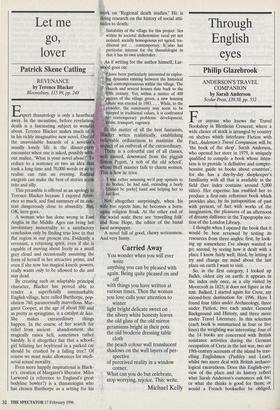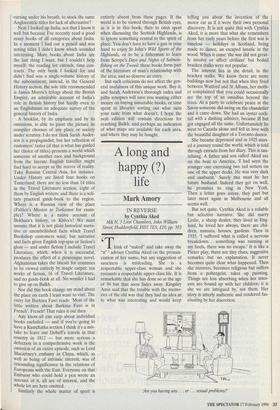Through English eyes
Philip Glazebrook
ANDERSON'S TRAVEL COMPANION by Sarah Anderson Scolar Press, £39.50, pp. 552 F or anyone who knows the Travel Bookshop in Blenheim Crescent, where a wide choice of stock is arranged by country on shelves which interleave Fiction with Fact, Anderson's Travel Companion will be 'the book of the shop'. Sarah Anderson, who opened her store in 1979, is uniquely qualified to compile a book whose inten- tion is to provide 'a definitive and compre- hensive guide to books about countries', for she has a day-by-day shopkeeper's familiarity with all that is available in the field (her index contains around 5,000 titles). Her expertise has enabled her to produce a first-rate reference book which provides also, by its juxtaposition of past with present, of fact with works of the imagination, the pleasures of an afternoon of dreamy dalliance in the Topography sec- tion of the London Library.
I thought when I opened the book that it would be best reviewed by testing its resources from three angles: first, by look- ing up somewhere I've always wanted to go; second, by seeing how it dealt with a place I know fairly well; third, by letting it try and change my mind about the last place on earth I want to visit.
So, in the first category, I looked up Balkh, oldest city on earth: it appears in the index only once, as a city visited by Moorcroft in 1825; it does not figure in the text. Balked, I started again for Crete, my second-best destination for 1996. Here I found four titles under Archaeology, three under Fiction, two each under General Background and History, and three more under Travel Literature. In this selection (each book is summarised in four or five lines) the weighting was interesting: four of the 14 books are concerned with British resistance activities during the German occupation of Crete in the last war, two are 19th-century accounts of the island by trav- elling Englishmen (Pashley and Lear), whilst two more deal with British archaeo- logical excavations. Does this English-eye- view of the place and its history reflect what Sarah Anderson's customers ask for, or what she thinks is good for them; or would a French bookseller be obliged, cursing under his breath, to stock the same Ang,locentric titles for lack of alternative?
Next I looked up India, not that I know it well but because I've recently read a good many books of all categories about India. In a moment I had out a pencil and was noting titles I didn't know which sounded interesting. More books, about India are the last thing I want, but I couldn't help myself: the reading list extends, time con- tracts. The only book I looked for and didn't find was a single-volume history of the subcontinent; instead, in the General History section, the sole title recommended is James Morris's trilogy about the British Empire, an admirable account of India's role in British history but hardly even to an Englishman an adequate survey of the general history of India.
A booklist, by its emphasis and by its omissions, is able to paint the picture its compiler chooses of any place or society under scrutiny. I do not think Sarah Ander- son is a propagandist, but her reflection of customers' tastes (if that is what has guided her choice of titles) presents a world which someone of another race and background from the literate English traveller might find hard to accept as the mirror of reality. Take Russian Central Asia, for instance. Under History are listed four books on Tamerland; there are no less than 14 titles in the Travel Literature section, eight of them by English writers: and there is a soli- tary practical guide-book to the region. Where is a Russian view of the place (Pahlen's Mission to Turkestan for exam- ple)? Where is a native account of Bokhara's history, or Khiva's? We must assume that it is not plain historical narra- tive or unembellished facts which Travel Bookshop customers want, but narrative and facts given English top-spin or fiction's gloss — and under fiction I include Travel Literature, which, when it is successful, produces the effect of a picaresque novel. Afghanistan takes the biscuit for countries to be viewed entirely by magic carpet: ten works of fiction, 16 of Travel Literature, and no guide-book at all. No wonder I had to give up on Balkh.
Nor did this book change my mind about the place on earth I least want to visit. The entry for Burkina Faso reads: 'Most of the little written about Burkina Faso is in French'. French! That rules it out then.
Any know-all can carp about individual books excluded — and if you're going to have a Kamchatka section I think it's a mis- take to leave out Dobell's travels in that country in 1812 — but more serious a defection in a comprehensive work is the omission of an entire episode, such as Lord Macartney's embassy in China, which, as well as being of intrinsic interest, was of resounding significance in the relations of Europeans with the East. Everyone on that Embassy who could hold a pen wrote an account of it, all are of interest, and the Whole lot are here omitted.
Similarly the whole matter of sport is entirely absent from these pages. If the world is to be viewed through British eyes, as it is in this book, then to omit sport when discussing the Scottish Highlands, is to ignore something central to the spirit of place. You don't have to have a gun in your hand to enjoy St John's Wild Sports of the Highlands, or to be a fisherman to learn from Scrope's Days and Nights of Salmon- fishing on the Tweed: these books form part of the literature of man's relationship with the area, and so deserve an entry.
But such criticisms do not affect the gen- eral usefulness of this unique work. Buy it, and Sarah Anderson's thorough index and pithy synopses will save you wasting either money on buying unsuitable books, or time spent in libraries sorting out what suits your taste from what doesn't. I hope the next edition will contain directions for reaching Balkh, and perhaps an indication of what maps are available for each area, and where they may be bought.



























































 Previous page
Previous page